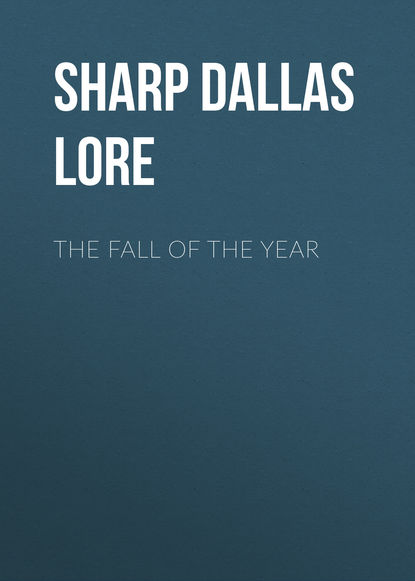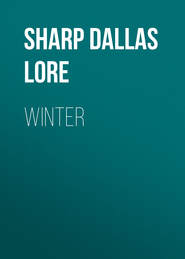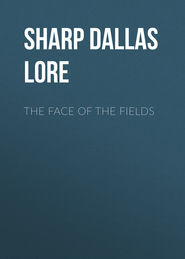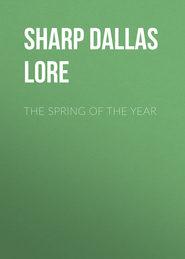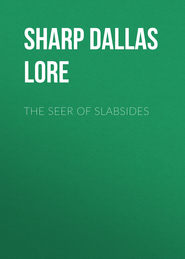По всем вопросам обращайтесь на: info@litportal.ru
(©) 2003-2024.
✖
The Fall of the Year
Настройки чтения
Размер шрифта
Высота строк
Поля
Now the work became more difficult. The sticks were newer, some of them being of seasoned oak and hickory, which the birds had taken from cord-wood piles.
I had cut my channel up the side of the nest nearly halfway when I came to a forked branch that I could neither break off nor push aside. I soon found that it was not loose, but that it belonged to the oak tree itself. It ran out through the nest horizontally, extending a little more than a foot beyond the rough walls.
Backing down, I saw that this fork was the support of the bulge that had given the nest its lopsided appearance. A few large timbers had been rested across it, small loose pieces had gradually lodged upon these, and thus in time brought about the big bulge.
I pushed off this loose stuff and the few heavy timbers and found that the fork would bear my weight. It now projected a little way from the walls of the nest. I got a firm hold on the forks out at their ends, swung clear, and drew myself up between them. After a lively scramble, I got carefully to my feet, and, clutching the sticks protruding from the side, stood up, with my eyes almost on a level with the rim of the great nest. This was better than cutting a channel, certainly – at least for the ascent, and I was not then thinking of the descent.
I looked over the protruding sticks of the rim. I caught a glimpse of large dull white eggs!
Eggs of shining gold could not have so fascinated me. There were thousands of persons who could have gold eggs if they cared. But eagles’ eggs! Money could not buy such a sight as this.
I was more than ever eager now to get into the nest. Working my fingers among the sticks of the rim for a firm grip, I stuck my toes into the rough wall and began to climb. At some considerable hazard and at the cost of many rents in my clothing, I wriggled up over the edge and into the hollow of the nest where the coveted eggs lay.
The eagles were wheeling and screaming overhead. The weird cac, cac, cac of the male came down from far above me; while the female, circling closer, would swoop and shrill her menacing, maniacal half-laugh almost in my ears.
Their wild cries thrilled me, and their mighty wings, wheeling so close around me, seemed to catch me in their majestic sweep and almost to carry me in swift, swinging circles through the empty air. An ecstasy of excitement overcame me. I felt no body, no weight of anything. I lost my head completely, and, seizing the eggs, rose to my feet and stood upright in the nest.
The eagles swept nearer. I could feel the wind from their wings. I could see the rolling of their gleaming eyes, and the glint of the sun on their snow-white necks. And as they dipped and turned and careened over me, I came perilously near trying to fly myself.
What a scene lay under me and rolled wide and free to the very edge of the world! The level marsh, the blue, hazy bay, the far-off, unblurred horizon beyond the bending hill of the sea! The wild, free wind from the bay blew in upon my face, the old tree trembled and rocked beneath me, the screaming eagles wove a mazy spell of double circles about me, till I screamed back at them in wild delight.
The sound of my voice seemed to infuriate the birds. The male turned suddenly in his round and swooped directly at me. The movement was instantly understood by his mate, who, thus emboldened, cut under him and hurled herself downward, passing with a vicious grab at my face. I dodged, or she would have hit me.
For the moment I had forgotten where I stood; and, in dodging the eagle, I almost stepped over the edge of the nest. I caught my balance and dropped quickly to my knees, completely unnerved.
Fear like a panic took instant hold on me. Only one desire possessed me – to get down. I crept to the edge and looked over. The sight made me dizzy. Sixty feet of almost empty air! Far down, a few small limbs intervened between me and the ground. But there was nothing by which to descend.
I was dismayed; and my expression, my posture – something, betrayed my confusion to the eagles. They immediately lost all dread of me. While I was looking over, one of them struck me a stinging blow on the head, knocking my cap off into the air.
That started me. I must climb down or be knocked over. If only I had continued with my channel to the top! If only that forked branch by which I ascended were within reach! But how could I back over the flaring rim to my whole length and swing my body under against the inward-slanting nest until my feet could touch the fork? But if I ever got down, that was what I must do; for the eagles gave me no chance to cut a channel now.
Laying the eggs back for the time in the hollow, I began tearing away the rim of the nest in order to clear a place over which to back down.
I was momentarily in danger of being hurled off by the birds; for I could not watch them and work, too. And they were growing bolder with every dash. One of them, driving fearfully from behind, flattened me out on the nest. Had the blow been delivered from the front, I should have been knocked headlong to the ground.
I was afraid to delay longer. A good-sized breach was opened in the rim of the nest by this time. And now, if the sticks would not pull out, I might let myself over and reach the fork. Once my feet touched that, I could manage the rest, I knew.
Digging my hands deep into the nest for a firm hold, I began cautiously to back over the rough, stubby rim, reaching with my feet toward the fork.
The eagles seemed to appreciate the opportunity my awkward position offered them. I could not have arranged myself more conveniently to their minds, I am sure. And they made the most of it. I can laugh now; but the memory of it can still make me shiver, too.
I had wriggled over just so that I could bend my body at the waist and bring my legs against the nest when a sharp stub caught in my clothes and held me. I could get neither up nor down. My handhold was of the most precarious kind, and I dared not let go for a moment to get off the snag.
I tried to back out and push off from it, but it seemed to come out with me. It must be broken; and pulling myself up, I dropped with all the force I could put into my body. That loosened, but did not break it. Suddenly, while I was resting between the efforts, the thing gave way.
I was wholly unprepared. All my weight was instantly thrown upon my hands. The jagged sticks cut into my wrists, my grip was pried off, and I fell.
Once, twice, the stubs in the wall of the nest caught and partly stopped me, then broke. I clutched frantically at them, but could not hold. Then, almost before I realized that I was falling, I hung suspended between two limbs – the forks of the white oak branch in the side of the nest.
I had been directly above it when the stub broke, and had fallen through it; and the two branches had caught me right under both of my arms.
For a second I was too dazed to think. Then a swish of wings, a hard blow on the neck, and a shooting pain made my position clear. I was not down yet nor out of danger. The angry birds still had me in reach.
Hanging with one arm, I twisted round until the other arm was free, then seized the branches and swung under, but not before the eagles had given me another raking dab.
Here beneath the branches, close up to the bottom of the nest, I was quite out of the reach of the birds; and through the channel I had cut in my ascent, I climbed quickly down into the tree.
It was now a mere matter of sliding to the ground. But I was so battered and faint that I nearly tumbled. I was a sorry-looking boy – my clothing torn, my hands bleeding, my head and neck clawed in a dozen places.
But what did I do with the eagles’ eggs? Why, I allowed the old eagles to hatch them. What else could I do? or what better?
CHAPTER VI
THANKSGIVING AT GRANDFATHER’S FARM
THANKSGIVING at Grandfather’s farm was more than a holiday. It was a great date on the calendar, for it divided the year in halves as no other single day of the three hundred and sixty-five did. It marked the end of the outdoors, and the beginning of the indoors – the day when everybody came home; when along with them into the house came all the outdoors, too, as if the whole farm were brought in to toast its toes before the great hearth fire!
For the hearth fire was big enough and cheery enough. And so was the farmhouse – that is, if you added the big barn and the crib-house and the wagon-house and the dog-house and the hen-house and the “spring-house!”
Oh, there was plenty of room inside for everybody and for everything! And there needed to be; for did not everybody come home to Grandfather’s for Thanksgiving? And did not everything that anybody could need for the winter, grow on Grandfather’s farm?
And it all had to be brought in by Thanksgiving Day – everything brought in, everything housed and stored and battened down tight. The preparations began along in late October, continuing with more speed as the days shortened and darkened and hurried us into November. And they continued with still more speed as the gray lowering clouds thickened in the sky, and the wind began to whistle through the oak grove. Then, with the first real cold snap, the first swift flurry of snow, how the husking and the stacking and the chopping went on!
Thanksgiving must find us ready for winter indoors and out.
The hay-mows were full to the beams where the swallows built; the north and west sides of the barnyard were flanked with a deep wind-break of corn-fodder that ran on down the old worm-fence each side of the lane in yellow zigzag walls; the big wooden pump under the turn-o’-lane tree by the barn was bundled up and buttoned to the tip of its dripping nose; the bees by the currant bushes were doubled-hived, the strawberries covered with hay, the wood all split and piled, the cellar windows packed, and the storm-doors put on.
The very cows had put on an extra coat, and turned their collars up about their ears; the turkeys had changed their roost from the ridge-pole of the corn-crib to the pearmain tree on the sunny side of the wagon-house; the squirrels had finished their bulky nests in the oaks; the muskrats of the lower pasture had completed their lodges; the whole farm – house, barn, fields, and wood-lot – had shuffled into its greatcoat and muffler and settled comfortably down for the winter.
The old farmhouse was an invitation to winter. It looked its joy at the prospect of the coming cold. Low, weather-worn, mossy-shingled, secluded in its wayward garden of box and bleeding-hearts, sheltered by its tall pines, grape-vined, hop-vined, clung to by creeper and honeysuckle, it stood where the roads divided, halfway between everywhere, unpainted, unpretentious, as much a part of the landscape as the muskrat-lodge, and, like the lodge, roomy, warm, and hospitable.
Round at the back, under the wide, open shed, a door led into the kitchen; another led into the living-room; another, into the store-room; and two big, slanting double-doors, scoured and slippery with four generations of sliders, covered the cavernous way into the cellar. But they let the smell of apples up, as the garret door let the smell of sage and thyme come down; while from the door of the store-room, mingling with the odor of apples and herbs, filling the whole house and all my early memories, came the smell of broom-corn, came the sound of Grandfather’s loom.
For Grandfather in the winter made brooms – the best brooms, I think, that ever were made. The tall broom-corn was grown on the farm in the summer, ripened and cut and seeded, and then, as soon as winter set in, was loomed and wired and sewed into brooms.
But the cured and seeded broom-corn was not the main thing, after all, that was brought in for the winter. Behind the stove in the kitchen, stood the sweet-potato box (a sweet potato, you know, must be kept dry and warm). An ample, ten-barrel box it was, fresh-papered like the walls, full of Jersey sweets that were sweet – long, golden, syrupy potatoes, such as grow only in the warm sandy soil of southern New Jersey.
Against that big box in Grandmother’s kitchen stood the sea-chest, fresh with the same kitchen paper and piled with wood. There was another such chest in the living-room near the old fireplace, and still another in Grandfather’s work-room behind the “template” stove.
But wood and warmth and sweet smells were not all. There was music also, the music of life, of young life and of old life – grandparents, grandchildren (about twenty-eight of the latter). There were seven of us alone – a girl at each end of the seven and one in the middle. Thanksgiving always found us all at Grandfather’s and brimming full of thanks.
That, of course, was long, long ago. Things are different nowadays. There are as many grandfathers, I suppose, as ever; but they don’t make brooms in the winter and live on farms.
They live in flats. The old farm with its open acres has become a city street; the generous old farmhouse has become a speaking-tube, kitchenette, and bath – all the “modern conveniences”; the cows have evaporated into convenient cans of condensed “milk”; the ten-barrel box of potatoes has changed into a convenient ten-pound bag, the wood-pile into a convenient five-cent bundle of blocks tied up with a tarred string, the fireplace into a convenient gas log, the seven children into one or none, or into a little bull-terrier pup.
But is it so? No, it is not so – not so of a million homes. For there is many an old-fashioned farmhouse still in the country, and many a new-fashioned city house where there are more human children than little bull-terrier pups.
And it is not so in my home, which is neither a real farm nor yet a city home. For here are some small boys who live very much as I did when I was a boy. No, they are not farmer’s boys; for I am not a farmer, but only a “commuter” – if you know what that is. I go into a great city for my work; and when the day’s work is done, I turn homeward here to Mullein Hill – far out in the country. And when the dark November nights come, I hang the lantern high in the stable, as my father used to do, while four shining faces gather round, as four small boys seat themselves on upturned buckets behind the cow. The lantern flickers, the milk foams, the stories flow – “Bucksy” stories of the noble red-man; and stories of the heroes of old; and marvelous stories of that greatest hero of all – their father, far away yonder when he was a boy, when there were so many interesting things to do on Grandfather’s farm just before Thanksgiving Day.





